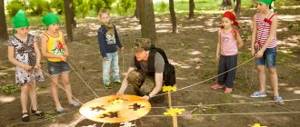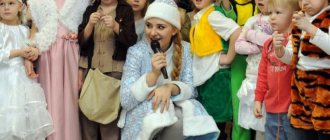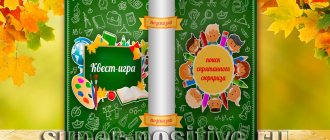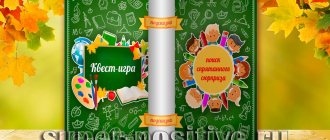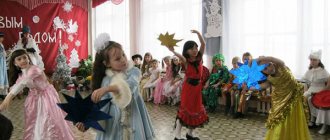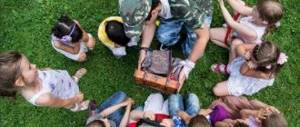Description of tasks
(key places where you can hide hints and surprises are indicated in brackets)
- Hint “Encrypted proverbs” ( magazine, flower, teapot ). A fun task for associative thinking. You need to guess which famous proverbs of the Russian language are encrypted with pictures.
- Hint “Literary work” ( battery, newspaper, umbrella, backpack ). A difficult task for intelligence: you need to cut out 9 squares with letters and fold them into one large square so that you can read the title of a literary work.
- Hint "Math terms" ( pantry, dining room, bedside table ). An excellent task for ingenuity, entertaining puzzles.
- Hint “Symbols of the countries of the world” ( picture, ladder, plant ). An interesting erudition task.
- Hint “Botanical fillword” ( vase, cabinet, bag, door, lamp, desk ). A good task that requires players to be focused and collected.
- Hint “Zoological code” ( camera, refrigerator, saucepan, envelope, presenter, piano, assembly hall, lobby ). First, you need to decipher the letters using the key, and then make a word from them.
- Hint “History of the Ancient World” ( diary, textbook, hanger ). An interesting quiz in the form of a test.
- Hints “English” ( window, table, chair ), “German” (table, chair). Riddles about animals.
- Hint “Color confusion” ( curtain, computer, TV ). An entertaining task for making anagrams, you need to restore the mixed up names of colors.
- Hint “Musical instruments” ( mirror, box, plate, gym ). Players will not only need to find the key to a tricky code, but also remember the names of musical instruments.
- Hint “Sports” ( corridor, notebook, telephone ). Using pictures and just one suggested letter, solve the crossword puzzle .
- Hint “Puzzle” ( globe, calculator, microscope, stand for pens and pencils, briefcase, photo frame, clock ). A simple but entertaining task: you need to put together a puzzle and, from the reconstructed picture, find out the place where the next clue is located.
View other ready-made quest kits
Extracurricular event “Autumn Quest”
How to organize distance learning during quarantine?
The Infourok project helps
for students in grades 5-7
Author:
Kristina Aleksandrovna Tarabukina, teacher of the Smaznevskaya Secondary School MCOU
Purpose:
organization of leisure time for students.
Tasks:
• updating knowledge about autumn
• expand your horizons, enrich your vocabulary
• create an emotional and joyful holiday atmosphere
• develop communication skills
Organization:
The competition program is structured in the form of a quest. Each class is a team. You should come up with a distinctive feature of the team in advance (ribbons, identical T-shirts, etc.). This should also be taken into account when summing up.
The quest itself consists of 3 parts:
1.
Gathering guests in the foyer, introducing teams, playing a team-building game.
2.
The quest itself. Teams receive the first pieces of the map, which indicate which office (point) they should start from. “Leaders” are waiting for them in the office, they are also members of the jury - they conduct a test (task, competition), award points to the team, give out the next piece of the card with the item number, and also sum up the results of the quest. There are 6 competitions in total (6 points). For incorrectly guessing the office encrypted in the picture - minus point.
On the other side of the card is a poem about autumn. At the end of the game, the resulting poems are read out.
3.
While the jury is making the results, several games are played with the guys.
Presenter:
Good afternoon everyone! I am glad to see everyone here in the foyer of our school. First, let's get to know our teams. Within a minute, you must confer and come up with a name for your team. But there is one condition: the name must correspond to the theme of our game today, that is, autumn.
Teams confer and introduce themselves
Presenter:
Great!
Today we have a somewhat unusual event, and it will take the form of a quest. And your first test will be. "Caterpillar".
You need to use a command to portray a caterpillar. And we do it this way: the team stands one after another in a column, holding the neighbor’s hand, which is in front by the waist. After these preparations, the presenter explains that the team is a caterpillar, and now cannot be torn apart. The caterpillar should show:
Presenter:
All the teams showed great caterpillars, so you get the first pieces of the map, which mark the points you need to get to. And already there new tasks await you. At each point you will receive a piece of the map, in the end you should have a map of your journey, and on the back - a kind of “autumn greeting”. You have an average of 5 minutes to complete each one. For each completed task you receive a point. We will reduce points for quarrels in the team, so be friendly to each other and your opponents, I wish you to have a positive time!
The first pieces of the card are given out. The teams begin the quest.
● Physics office - “Communication point”
Equipment:
piece of card, rope.
Presenter:
Guys, what kind of autumn do you like - sunny or rainy? Of course it's sunny! Today, for example, ______ (one member of the team stands on the edge) will be the sun, and you will all try to keep him with us longer. How? Here is a rope; at the signal, each team must pull it through their clothes (sleeves) as quickly as possible. Go!
The time is recorded, and as a result, the team that completed the rope the fastest gets 5 points, the rest of the teams get 3 and 2 points, respectively.
● Russian language classroom - “Autumn chaos”
Equipment:
a piece of map, cards with proverbs.
Presenter:
We have an emergency here. I was preparing for the lesson here, I printed out proverbs and sayings about autumn, but there was a draft, and all the words got mixed up. Help me compose them, please! For each correctly composed proverb, your team receives 0.5 points, and if you can explain its meaning, then another 0.5 points. You can earn a maximum of 12 points.
3 minutes to make up proverbs, 2 minutes to check
and spring will have its say.
About the kit
- This kit will help to congratulate schoolchildren in an interesting and original way both on the beginning of the school year on Knowledge Day on September 1, and on the end of their studies (at the last bell, at graduation), as well as conduct an exciting educational game for any occasion

